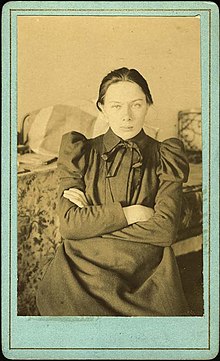Nadezhda Konstantinovna Krupskaya
| Nadezhda Krupskaya | |
|---|---|
| Надежда Крупская | |

Nadezhda Krupskaya, c. 1890s
|
|
| Deputy Minister of Education in the Government of the Soviet Union | |
|
In office 1929 – 27 February 1939 |
|
| Personal details | |
| Born |
Nadezhda Konstantinovna Krupskaya 26 February 1869 St. Petersburg, Russian Empire |
| Died | 27 February 1939 (aged 70) Moscow, Russian SFSR, Soviet Union |
| Political party |
Russian Social Democratic Labour Party (Bolsheviks) (1903–1912) Russian Communist Party (1912–1939) |
| Spouse(s) | Vladimir Lenin (m. 1898–1924) |
Nadezhda Konstantinovna "Nadya" Krupskaya (Russian: Наде́жда Константи́новна Кру́пская, scientific transliteration Nadežda Konstantinovna Krupskaja; 26 February [O.S. 14 February] 1869 – 27 February 1939) was a Russian Bolshevik revolutionary, politician, and the wife of Vladimir Lenin from 1898 until his death in 1924. She served as the Soviet Union's Deputy Minister of Education from 1929 until her death in 1939.
Nadezhda Krupskaya was born to an upper-class but impoverished family. Her father, Konstantin Ignat'evich Krupski (1837–1897), was a Russian military officer and a nobleman of the Russian Empire who had been orphaned in 1847 at age nine. He was educated and given a commission as an infantry officer in the Russian Army. Just before leaving for his assignment in Poland, he married Krupskaya's mother. After six years of service, Krupski lost favor with his supervisors and was charged with "un-Russian activities." He may have been suspected of being involved with revolutionaries. Following this time he worked in factories or wherever he could find work. Just before his death, he was recommissioned as an officer.
Krupskaya's mother, Elizaveta Vasilyevna Tistrova (1836–1915), was the daughter of landless Russian nobles. Elizaveta's parents died when she was young and she was enrolled in the Bestuzhev Courses, the highest formal education available to women in Russia at the time. After earning her degree, Elizaveta worked as a governess for noble families until she married Krupski.
Having parents who were well educated, and of aristocratic descent, combined with firsthand experience with lower class working conditions likely led to the formation of many of Krupskaya's ideological beliefs. "From her very childhood Krupskaya was inspired with the spirit of protest against the ugly life around her."
...
Wikipedia
